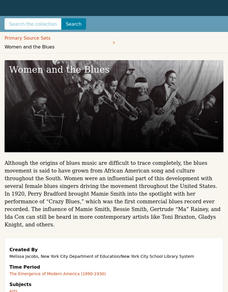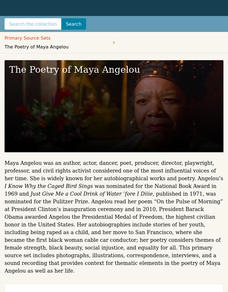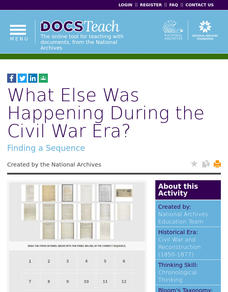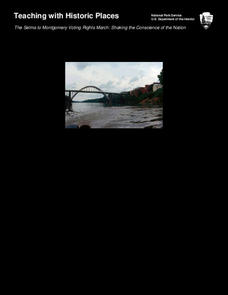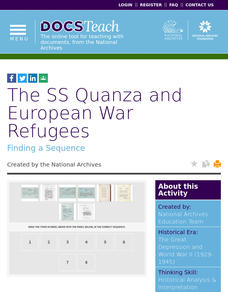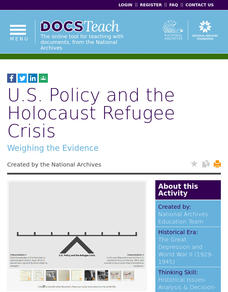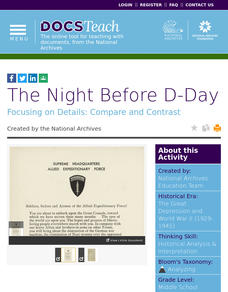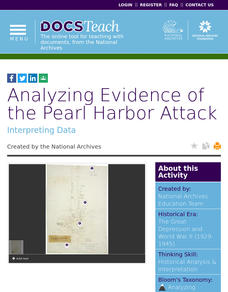Roy Rosenzweig Center for History and New Media
The Battle of Trenton
The Continental Army's victory at the Battle of Trenton marked a turning point in the American Revolution. Young historians examine maps, read primary source materials, and create a timeline of events to understand why the victory was so...
Digital Public Library of America
The Watsons Go To Birmingham—1963 by Christopher Paul Curtis
A primary source set of photographs, videos, newspaper articles, and FBI reports provides insight into race relations during the 1960s, the Sixteenth Street Baptist Church bombing, and the murder of Emmitt Till. Designed to be used to...
Digital Public Library of America
Women and the Blues
A 12-piece primary source packet sets the tone for a study of the role women played in the origins, development, and impact of blues music. Legends like Bessie Smith, Gertrude "Ma" Rainey, Mamie Smith, and Ida Cox are featured, as are...
Digital Public Library of America
The Poetry of Maya Angelou
Maya Angelou's work reflects her passion for life, civil rights, and justice for all. A collection of 12 primary sources provide scholars with insight into this amazing woman. The set includes photographs, articles, recordings of...
Crabtree Publishing
The Genius of the Ancients
It is said that necessity is the mother of invention. Fifth graders prove this with help from three lessons that examine how ancient cultures used their needs to drive innovations. In lesson one, pupils identify main ideas and supporting...
National Park Service
The Battle of Stones River: A Contrast in Leadership Styles
US Commanding General William S. Rosecrans led the Union soldiers and Confederate Commanding General Braxton Bragg led the rebel army at the Battle of Stones River. Young historians compare how the leadership styles of these two...
National Park Service
Lesson 2: Hope
There's hope in music. Pupils discover what gave enslaved people hope by examining lyrics and music during their time of bondage. A series of prompts helps individuals investigate songs of enslaved people. The cumulative assignment...
DocsTeach
The Impact of Westward Expansion on Native American Communities
Although Westward Expansion is often romanticized, its impact was devastating on Native American communities. Primary source documents, including pictures of United States troops invading indigenous lands and Native American tribes, tell...
DocsTeach
Patent Analysis: Joseph Glidden's Barbed Wire
Barbed wire may have made cattle farming easier, but it brought to an end the free-roaming days of the plains. No longer could Native American groups continue their nomadic lifestyle, and the days of cowboys herding large groups of...
DocsTeach
What Else Was Happening During the Civil War Era?
Examine a time of political division and upheaval— not unlike our own—using firsthand accounts. While study of the Civil War often takes center stage in the classroom, the 1850s and 1860s were a period of profound change in other areas...
National Park Service
The Selma to Montgomery Voting Rights March: Shaking the Conscience of the Nation
Travel back in time to examine how tragic events can spur positive change. Scholars explore the impact of the Selma Voting Rights March, including the tragic loss of life and the later signing of the Voting Rights Act of 1965. Academics...
DocsTeach
The SS Quanza and European War Refugees
World War II not only resulted in major loss of life, but it also displaced thousands of people. An eye-opening activity uses primary documents to explore the refugee crisis during World War II. Scholars compare the event to modern-day...
National Park Service
Discover the Mary Ann Shadd Cary House
Mary Ann Shadd Cary was an extraordinary woman, no matter the time period. Academics research the life and achievements of Mrs. Cary, who was born a free African American in 1823. The lesson uses primary sources, worksheets, written...
DocsTeach
Where Was the New Deal?
Young historians delve into the origin of federal social programs to understand the impact of the New Deal. An informative activity explores some of the New Deal programs, such as the Civilian Conservation Corp, using historical...
DocsTeach
U.S. Policy and the Holocaust Refugee Crisis
How did the United States respond to the Holocaust refugee crisis during World War II? The activity focuses on the United States' foreign policies and the arguments for and against offering assistance. Scholars analyze historical...
DocsTeach
Two Versions of FDR's Infamy Speech
Historians follow FDR's Infamy speech from rough draft to the official address to the Senate. An intriguing activity compares and contrasts FDR's original speech to the official version. Academics also listen to FDR address the Senate....
DocsTeach
The School Lunch Program and the Federal Government
The school lunch program is rooted in the struggles of the Great Depression and is still assisting families today. Academics research documents and images relating to the creation of the school lunch program. Scholars use a worksheet to...
DocsTeach
The Night Before D-Day
Get inside the mind of General Eisenhower regarding the D-Day invasion. An interesting activity uses historical documents to highlight the differences between Eisenhower's public stance on D-Day and his private opinions. Scholars analyze...
DocsTeach
The New Deal: Revolution or Reform?
Scholars weigh in on FDR's New Deal policies in an in-depth activity. The resource uses historical documents to explore whether the New Deal polices were reformatory or revolutionary. Learners review documents, rate them using a scale,...
DocsTeach
Pearl Harbor Dispatch Analysis
Scholars play a historical version of the telephone game when they analyze the dispatch from the Pearl Harbor attack. The quick activity uses primary sources to help academics analyze an historical event. Young historians also complete a...
DocsTeach
Letter to Truman about the Manhattan Project
Delve into the past to understand the opposition to the Manhattan Project. An interesting activity is designed to be completed in pairs, groups, or individually. Scholars analyze historical documents, complete an online worksheet, and...
DocsTeach
Confronting Work Place Discrimination on the World War II Home Front
Before the Civil Rights Movement was in full swing, FDR's executive order helped promote fair employment. The activity uses primary documents to explore FDR's executive order to help minorities gain equal employment and pay during the...
DocsTeach
Analyzing Evidence of the Pearl Harbor Attack
Don some detective caps and delve into the past to explore the evidence left behind after the attack on Pearl Harbor. An interesting activity uses primary sources to explore how the United States Navy was caught off guard and how the...
DocsTeach
Analyzing a Writing Assignment by a Teenage Refugee in New York During World War II
Young historians delve into the world of teenage refugees during WWII to understand their experiences. The activity focuses on a writing assignment from a teen staying at a US refugee camp to explore the struggles they faced, such as...




